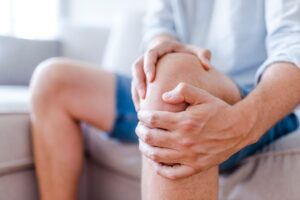
Knee pain can have major consequences for your daily life. It might be so bad that something as simple as walking around the grocery store or climbing a flight of stairs becomes almost unbearable. While some people need surgery in order to find relief, others experience excellent results with non-surgical treatment options. What are some effective non-surgical therapies for knee pain? This blog post lists a few.
Exercise/Physical Therapy
Although it may be uncomfortable to move, some targeted physical exercises can reduce certain types of knee pain. For example, if you have arthritis, regular exercise may help to strengthen your knees and maintain the cartilage that is left remaining in the joint. Options like walking and swimming can be beneficial. You could also ask your doctor to refer you for physical therapy.
Medication
Some people find that consistent use of over-the-counter medications, such as ibuprofen and Tylenol, can reduce knee pain. The problem with medications is that while they can relieve pain, they do not address the real cause of the discomfort. Plus, some people with certain allergies or medical conditions should not take pain relievers.
Knee Brace
A knee brace may help to stabilize the joint and prevent it from feeling like it is going to give out. The biggest downside to this option is that many patients complain a brace can be hot and uncomfortable. Long-term use can even cause skin irritation.
PRP Injections
To perform platelet-rich plasma (PRP) injections, a doctor takes a sample of your own blood and places it in a centrifuge in order to separate the part of the blood that is rich in platelets. Then platelets are injected at the site of the knee pain, where they can encourage pain relief and promote healing of damaged tissues. Many patients find that, after PRP injections, they enjoy reduced pain, increased mobility, and a heightened overall quality of life.
If you are interested in PRP injections for knee pain, be aware that some doctors do not offer this therapy. It would be best to visit an orthopedic physician who specializes in non-surgical treatments.
Which Treatment Is Right for You?
The best treatment for knee pain depends on what is causing it. If you are struggling with ongoing discomfort, talk to an orthopedic doctor about your options. After they thoroughly examine your joint, they can offer practical suggestions to move you toward relief. Hopefully, you will find a treatment that improves your quality of life without subjecting you to the risks and downsides of surgery!
Meet the Practice
Dr. Paul Tortland is a Doctor of Osteopathic Medicine who is board-certified in Regenerative Medicine and Sports Medicine. He is a leader in his field and is proud to offer PRP injections for knee pain as one of his many services. If you are struggling with musculoskeletal aches and pains, he and our team can evaluate the situation and provide personalized advice on your next steps. To learn more about how we may be able to serve you, contact the New England Stem Cell Institute in Glastonbury at 860-430-2821.
